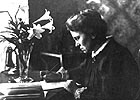
EMMA GOLDMAN (1869-1940)

Emma Goldman was an outspoken, radical anarchist. She championed freedom from all forms of oppression. Born in Lithuania on June 27, 1869, Emma's early years were not happy. Living conditions were difficult, her mother was depressed, and her father made her life nearly impossible with his angry outbursts. Emma's family moved to St. Petersburg when Emma was thirteen, while there she was exposed to progressive books and ideas. After her father tried to force her into marriage at fifteen, she and her sister fled Russia for America in 1885 and settled in Rochester, New York.. Emma was seventeen and she soon found work in a factory, but wages and living conditions were abysmal. She began following events in the Labor Movement, and in 1886, when a bomb exploded during a Labor protest in Haymarket Square in Chicago, Emma was troubled by the crime being attributed to men she felt were innocent. Her anarchist ideals emerged with greater force, and by1889, Emma left Rochester for New York City (and left her husband, Jacob Kersher, as well.)
"The numerous causes for which Goldman worked throughout her life were all expressions of her impassioned dedication to the anarchist principle of absolute freedom. In late 1889, she and her first great love and eventual life-long comrade, fellow Russian immigrant Alexander Berkman, "made a pact - to dedicate [themselves] to the Cause in some supreme deed, to die together if necessary, or to continue to live and work for the ideal for which one of [them] might have to give his life." Her eloquence and dedication quickly made her a popular speaker and a prominent member of New York's immigrant anarchist community." (Accessed 12-13-03, http://www.jwa.org/exhibits/wov/goldman/dedicated.html)
Her views often led to confrontations with the establishment, including with the organized suffrage movement. "Goldman's determination to speak out on her controversial views on sexual and reproductive freedom led to frequent arrests. It also brought her into conflict with the mainstream women's movement, which she saw as conservative and benefiting primarily the middle class. Goldman opposed the contemporary fight for women's suffrage and efforts to open professional careers to women, believing they would result at best in the illusion of improvements to a fundamentally corrupt system. To her, these causes were mere distractions from deeper, more important internal struggles. "[Woman's] development, her freedom, her independence," she claimed, "must come from and through herself. First by asserting herself as a personality, and not as a sex commodity. Second, by refusing the right to anyone over her body;... by refusing to be a servant to God, the State, society, the husband, the family, etc.... By freeing herself from the fear of the public opinion and the public condemnation." (Accessed 12-13-03, http://www.jwa.org/exhibits/wov/goldman/dedicated.html)
Emma Goldman was dubbed "the most dangerous woman in America" and was deported to the Soviet Union in 1919, along with fellow anarchist Alexander Berkman. After only 23 months there, she left, disillusioned with the Lenin regime. She spent her remaining years in Sweden, France, Germany, Spain, Canada and Britain. In the U.K. she married to obtain citizenship, and "became the London representative of the National Confederation of Labor and the Anarchist Federation of Iberia" (Accessed 12-13-03, http://www.jwa.org/exhibits/wov/goldman/exile.html). She spoke against the rise of Hitler in Germany during the 1930's. She died in May, 1940, after suffering a debilitating stroke in February of that same year. Her body was returned to the United States. She was buried in Haymarket Square near the anarchists that had so inspired her many years before.
Goldman's voice touched the lives of many generations, inspiring freedom and rebellion, encouraging independent thought, and inviting women to question their roles. She is to this day one of the most radical feminist voices in history, and a visionary whose words have challenged generations of young women to rethink their role in society.
WEBLINKS
Excerpt from Emma Goldman's Autobiography
http://sunsite.berkeley.edu/Goldman/
http://sunsite.berkeley.edu/Goldman/project.html
http://www.geocities.com/Paris/2159/redemm.html
http://us.history.wisc.edu/hist102/bios/20.html
RELATED LITERATURE
Goldman, Emma and Drinon, Richard and Anna, eds. Living My Life: An Autobiography of Emma Goldman. . New York: Meridian, 1977.
Waldstreicher, David. Emma Goldman. New York: Chelsea House Publishers, 1990.